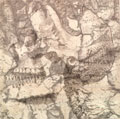 When Piano Magic starts singing about libraries, things are right in the universe once again. By a similar axiom, a good Piano Magic album is marked by its invocation of libraries in one or more songs. Thus, the "The Tollbooth Martrys," the seventh song on The Troubled Sleep Of Piano Magic, is evidence that Magic has produced another splendidly ethereal album. This wasn't the case with the previous album, Writers Without Homes, which was noticeably devoid of libraries.Green UFOs
When Piano Magic starts singing about libraries, things are right in the universe once again. By a similar axiom, a good Piano Magic album is marked by its invocation of libraries in one or more songs. Thus, the "The Tollbooth Martrys," the seventh song on The Troubled Sleep Of Piano Magic, is evidence that Magic has produced another splendidly ethereal album. This wasn't the case with the previous album, Writers Without Homes, which was noticeably devoid of libraries.Green UFOs
There are very certain elements which work for Piano Magic: sounds of desolation; wind-swept soundscapes; eye-blisteringly good artwork; female vocals of approximate age eight which expound on libraries; eccentric post-studio sounds, some of which sound like electronic birds, others of which sound like electronic mauls and hacksaws. What happened during the thankfully brief and innocuous flirtation with the 4AD label (the band has moved on to the Spanish label Green UFOs) was that the band eschewed and disregarded these elements. The cover art (once a beauty equaling and sometimes surpassing the music itself) became the generic "new" 4AD look, which plagues all their recent releases; the music became far more baroque and populated by more and more instruments; it was filled out (in other words, less desolation and isolation) to the point where it approached post-rock jam band; the vocals became burdensome instead of bolstering. But now, Piano Magic have found a way to reconcile some of the old elements with the new. "Saint Marie" starts off this new album humbly enough: a tremulous guitar line syncopated by frontman Glen Johnson's hushed vocals. Soon, though, a pulsing stereo of guitars rises and falls alternately, which itself is then punctuated by fast programmed beats of a drum machine. It's an engrossing and compelling sound that persists for the better part of four and a half minutes. It doesn't change much, but it doesn't need to. And this is precisely what used to make Piano Magic magic: the ability to make the sustained repetition of a created sound utterly compelling. Indeed, there are some moments which feel like sloppy seconds from the 4AD affair, but they are mediated by stronger songwriting and a moodier atmosphere. "Speed the Road, Rush the Lights," the weakest song on the album, could be a vestige of Writers Without Homes, and yet I can sense the band turning away from a song like this throughout the rest of the album, which thereby makes this song more palatable. Another illustrative track is "The Teacher's Son," which contrasts the old and new sound of Piano Magic perfectly. For the first minute of the song, there is a spare and lovely guitar line with Johnson's vocals amidst it. An old Piano Magic song could have maintained this sound for five minutes without tiring or growing tedious. But at about 1:15 into the song, the other instruments (bass and percussion, not of the electronic sort) crash in. During the brief 4AD period, the song would have been irreparably marred by these instruments. Yet the ensemble makes it work in this case, and I suspect it has to do with the stronger song-writing. Curiously, Piano Magic has retrieved most of its gothic gloom and beauty ever since its divorce from 4AD, though one might have thought it would have surely increased threefold in that marriage. In any case, it's good to see the band has rediscovered its eloquence for libraries and the sound of desolation, and I can only hope the next album will reintroduce the electronic birds I once adored so much. 
Read More

